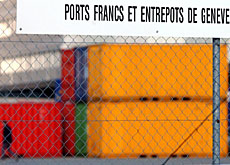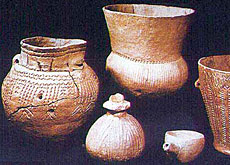Swiss free ports seek to improve their image

Switzerland’s 16 free ports will be forced to be more transparent about their activities under new legislation being introduced.
The free port of Geneva – one of the biggest in Switzerland – welcomes the development, which it hopes will improve the image of the customs posts.
The ports’ reputation has been harmed in recent months amid reports of works of art being smuggled across Switzerland’s borders.
But on Tuesday, Geneva free port authorities sought to repair some of the damage by hammering home the message that “the free ports are not law-free zones”.
“The revised customs legislation and the new law on the transfer of cultural goods should enable us to rid ourselves of the few black sheep that damage our reputation,” said port president Louis Ducor at a news conference.
“But even under the current legislation we can act,” he added.
It will be some time before the new federal legislation comes into force. The law on the transfer of cultural goods – due to be enacted in 2005 – is still being discussed in parliament.
And the revision of the customs law, which the government gave the green light to in December, also has to go through parliament.
Swiss case
Until then, the Swiss free ports can continue to benefit from the comparative advantages they have over their European competitors.
“The European Union free ports are subordinate to the customs authorities,” said Roland Hirt of the Swiss customs authorities.
“So they have to keep a detailed inventory of all the goods that pass through their hands. That is not the case in Switzerland, [where] goods can be warehoused for an indefinite period of time,” Hirt added.
“The new laws will bring Switzerland into line with the norms that apply in the rest of Europe.”
Respecting confidentiality
For Switzerland’s customs posts, the main change resulting from the new legislation is that they will in future have to keep detailed inventories of the goods passing through them.
“But the requirement for an inventory must not be allowed to affect the private dealings of our clients,” argued Alain Disch, director of the transport firm Rodolphe Haller SA.
“That could drive away private collectors, art dealers, gallery owners and auction houses.”
“And that in turn would hurt the economy of Geneva, as well as the economies of the other three big Swiss free ports – Zurich, Basel and Chiasso,” stressed Disch.
Christie’s Europe – one of the two biggest auction houses worldwide – also emphasised the economic importance of the free ports.
“Geneva is the number one place for auctioning jewellery,” said company CEO Francois Curiel.
“It accounts for 60 per cent of the world market. For Switzerland that means revenues of $6-8 million (SFr7.4-9.8 million) a year.
“The quality of the free port and its proximity to the airport allow us to do business in record time.”
But Yves Fischer of the Federal Justice Office believes the new legislation will not lead to clients’ anonymity being lost “provided they respect the law”.
swissinfo, Frédéric Burnand in Geneva
Switzerland has 16 free ports, of which the biggest are Geneva, Zurich, Basel and Chiasso.
They enable the duty-free export and import of goods and the warehousing of goods for an indefinite period.
Taxes are subsequently paid in the country of destination.
Swiss customs authorities monitor goods entering and leaving through the free ports.

In compliance with the JTI standards
More: SWI swissinfo.ch certified by the Journalism Trust Initiative


You can find an overview of ongoing debates with our journalists here . Please join us!
If you want to start a conversation about a topic raised in this article or want to report factual errors, email us at english@swissinfo.ch.